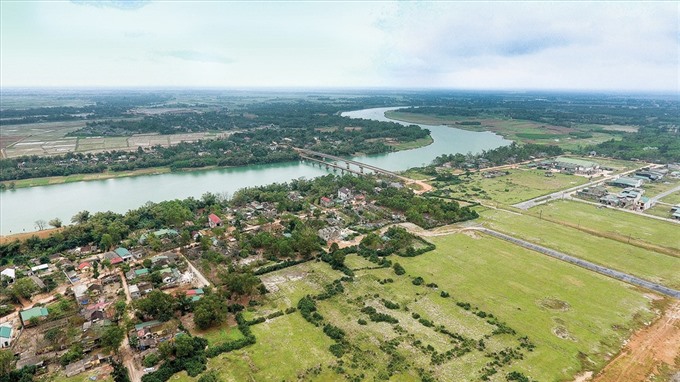[ad_1]
 |
| An overview of today’s Triệu Ái Commune, Triệu Phong District, Quảng Trị Province, with various traces of the Nguyễn lords. — File Photo |
QUẢNG TRỊ — Authorities of Triệu Phong District in central province of Quảng Trị held a ceremony on Tuesday to receive special national certification for historical relic sites of the Nguyễn lords in the locality.
The sites include residential palaces in communes of Triệu Ái and Triệu Giang and Ái Tử Town of Triệu Phong District.
On June 20, 2018, the Ministry of Culture, Sports and Tourism added these places to the list of national relic sites
The sites include Ái Tử Palace (used in 1558-1570), Trà Bát Palace (1570-1600) and Cát Palace (1600-1626) and Trảo Trảo Temple (Ái Tử Town).
Nearly 500 years ago, in October 1558, Nguyễn Hoàng was assigned by King Lê Anh Tông to move to Thuận Hóa to manage the locality. Nguyễn Hoàng and his troops took to sea to reach Việt Yên Beach and then went upstream of Thạch Hãn River and stopped at Sa Khưu in Ái Tử Commune, Vũ Xương District.
When he set feet on the new land, Nguyễn Hoàng was supported by local authorities and people. He decided to choose the sandy area to camp, which was then the first palace of Nguyễn lords in Triệu Phong.
During his 68 years living in Triệu Phong, Lord Nguyễn Hoàng moved his palace twice. After 12 years at Ái Tử, he moved the camping area to Trà Bát. Then in 1600, he moved the camping place from Trà Bát to Dinh Cát. The areas acted as political and administrative centres to manage the whole Thuận – Quảng area.
In 1613, Lord Nguyễn Hoàng died. His son Sãi Nguyễn Phúc Nguyên took his position and completed his father’s wills. In 1626, Lord Nguyễn Phúc Nguyên moved the administrative office to Phước Yên (now Quảng Điền District, Thừa Thiên Huế Province).
In 68 years managing Triệu Phong area, lords Nguyễn Hoàng and Nguyễn Phúc Nguyên focused on establishing military camps and promoting trading and culture with various localities.
The period witnessed advances in economic and society for the Thuận Hóa-Đàng Trong region.
According to historians, the first palaces of Nguyễn lords in Ái Tử and Trà Bát in Vũ Xương District have great meaning to the nation’s development as these were the first administrative bases to mark a milestone for a new royal reign – the reign of the Nguyễn lords and the Nguyễn dynasty. — VNS
[ad_2]
Source link
